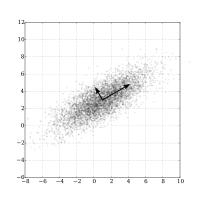
Photo from wikipedia
Random noise attenuation of seismic data is a fundamental problem in seismic data processing. It is not only an important problem itself, but also a crucial step for the subsequent… Click to show full abstract
Random noise attenuation of seismic data is a fundamental problem in seismic data processing. It is not only an important problem itself, but also a crucial step for the subsequent tasks, for example, migration and inversion. We propose a local orthogonalization-constrained unsupervised deep-learning denoiser (LOUD) to suppress seismic random noise based on a new loss function that specifically adapts to seismic data. Through unsupervised learning, we eliminate the common need for supervised learning approaches of collecting or generating sizable clean and noisy image pairs, which is challenging and expensive, especially for seismic data. We utilize a deep convolutional autoencoder to reconstruct the clean seismic image and leverage the local signal-and-noise orthogonalization as a constraint to guarantee that the removed noise component is orthogonal to the recovered signal. Experimental results on both synthetic and field datasets exhibit the effectiveness of our proposed method over traditional denoising methods.
Journal Title: IEEE Transactions on Geoscience and Remote Sensing
Year Published: 2022
Link to full text (if available)
Share on Social Media: Sign Up to like & get
recommendations!